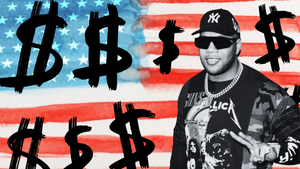The US Supreme Court has answered an important question about damages in American copyright infringement cases which was posed during a dispute over a Flo Rida sample. Basically, the top court ruled, if a copyright owner sues over an infringement that took place years or even decades ago, providing their claim meets the requirements of the statute of limitations, they can claim damages all the way back to the day of infringement.
The sample at the centre of this legal battle came from 1984 Tony Butler track ‘Jam The Box’ and appeared in Flo Rida’s 2008 release ‘In The Ayer’. Butler, working with music publisher Warner Chappell, cleared the sample for use in Flo Rida’s track. However, years later a man called Sherman Nealy popped up claiming that he actually owned the copyright in ‘Jam The Box’, having signed Butler to his Miami-based label Music Specialist back in the 1980s.
Under US copyright law, infringement claims must be made within three years of the infringement or - by applying a thing called the ‘discovery rule’ - within three years of the copyright owner discovering the infringement. Nealy argued that he only discovered the infringing Flo Rida sample in 2016, less than three years before he sued in 2018.
By applying the discovery rule he could make a claim, but then came the big question about damages. If his claim was successful, could he only claim damages back up to three years - in line with the statute of limitations - or all the way back to the release of ‘In The Ayer’ in 2008?
That question was put to the Eleventh Circuit Appeals Court, which said all the way back to 2008 seemed right. But that conflicted with how the Second Circuit Appeals Court, elsewhere in the US, answered the same question in another case in 2020. Hence why the whole thing was bounced up to the Supreme Court.
In its judgement, the Supreme Court first said that it “assumed” the discovery rule applied in this case and Nealy could therefore pursue an infringement claim. On that basis, it considered “whether a claim satisfying that rule is subject to another time-based limit … preventing the recovery of damages for any infringement that occurred more than three years before a lawsuit’s filing”. It then ruled, “We hold that no such limit on damages exists. The Copyright Act entitles a copyright owner to recover damages for any timely claim”.
So that's nice and straightforward. Except, you might wonder, why is the Supreme Court merely “assuming” that the discovery rule applies in this case, meaning that Nealy can sue and the damages question is subsequently posed?
Well, some people argue that the discovery rule shouldn't even apply in copyright cases, and those people would have quite liked the Supreme Court to say so. But, the Supreme Court decided that - because that specific question hadn't been raised in the Flo Rida sample case - it wasn't going to answer it.
“In this case”, the judges wrote, “we assume without deciding that a claim is timely under that provision if brought within three years of when the plaintiff discovered an infringement, no matter when the infringement happened”.
Six of the judges in the Supreme Court backed the judgement, but three dissented. Those three judges felt that the question as to whether or not the discovery rule applies in copyright cases is rather important and should have been answered. Probably with a big fat “no”.
In a dissenting judgement, they wrote that the court had considered how the discovery rule should operate under the Copyright Act, “but in doing so it sidesteps the logically antecedent question whether the act has room for such a rule. Rather than address that question, the court takes care to emphasise that its resolution must await a future case. The trouble is, the act almost certainly does not tolerate a discovery rule. And that fact promises soon enough to make anything we might say today about the rule’s operational details a dead letter”.
Nealy’s copyright infringement lawsuit is actually still going through the motions at a district court level while the big question about damages was posed in the Supreme Court. If Nealy ultimately prevails, yesterday's judgement could have a big impact on the damages he can claim.
The ruling will also impact on the damages claimed in other copyright infringement lawsuits. Indeed, it may make pursuing a lawsuit more attractive for copyright owners relying on the discovery rule in relation to infringements where the big damages stem from usages long ago.
Meanwhile, we await to see whether any future case will force the Supreme Court to answer that initial discovery rule question. If answered “no”, that will render yesterday's ruling redundant, as the dissenting judges noted.

